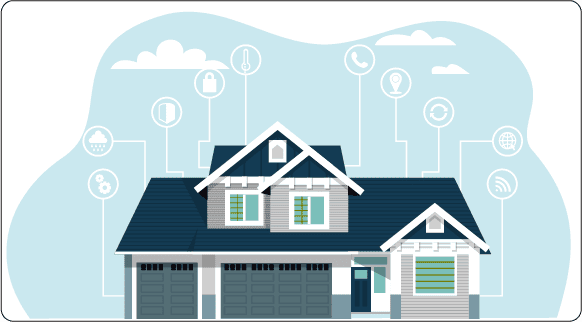The Impact of Technology on the Real Estate Industry

It is meaningless to say that the mode of operation of the real estate market has changed in the recent years. As the pandemic escalates, the demand for technological advancement in the real estate industry has become critical.
The pandemic has also promoted this change in the real estate industry. PropTech, which has traditionally been slow to adapt to technology, has undergone a significant shift.
PropTech is booming here, reshaping the real estate space by changing our perception of real estate investment. Driven by the ever-changing digital environment and new consumption patterns, the real estate industry is used to improve it.
According to a report released by Ernst & Young, real estate companies now understand that they must adapt to the ever-changing technological environment to remain relevant and gain a competitive advantage.
The demand for technology-enabled real estate platforms continues to grow, and the use of some trends such as artificial intelligence, machine learning, and robotic process automation (RPA) may increase significantly in upcoming years. These technologies enable a systematic and comprehensive evaluation of the most diverse characteristics. Now.
The Continuous Development of Artificial Intelligence in the Real Estate Field
Artificial intelligence makes the decision-making process around asset identification and selection easier. AI platforms use algorithms and machine learning to process large data sets to identify correlations, patterns, and relationships between various parameters and variables. By identifying these variables and assessing their impact in the multi-level probability model, the asset selection process evolves from subjective assessment to deterministic and quantifiable assessment over time.
Well-thought-out artificial intelligence algorithms constantly check the feasibility and effectiveness of various parameters; this usually produces meaningful information, which triggers the butterfly effect. The butterfly effect refers to the unpredictable non-linear effect of a slight change on a complex system. Artificial intelligence can also help predict safety risks or construction defects, thereby saving time and money.
AI helps property valuations, that is, it can use “predictive analysis” algorithms to determine property prices. The predictive analysis algorithm evaluates the possibility of major events-changes in micro-market demographic structure; income distribution of community residents; prediction/feasibility of future competitive quotations; this helps determine the true intrinsic value of real estate.
The market often does not match the intrinsic value, which provides an excellent opportunity to use algorithms to identify assets whose intrinsic value is higher than the current market interest rate.
Cloud Customization is Easier
For those interested in real estate, cloud services have proven to be extremely useful because they can now access the data of each property from anywhere. Which potential customers can visit to answer customer questions about any property of interest to them. This reduces the manual workload in the office and saves a lot of time and effort when searching for objects.
According to Rapid Scale, “approximately 80% of leading PropTech companies are using some form of cloud technology.”
Cloud computing provides three main service models, each of which meets a specific set of business requirements:
- software as a service (SaaS),
- platform as a service (PaaS), and
- infrastructure as a service (IaaS).
Virtual Real Estate Tour
As the second wave hits our country, traffic is restricted, so it is difficult to visit the properties that investors/buyers are interested in. Now you can visit the page virtually and decide. A video conference is planned between stakeholders and buyers to answer all real estate-related questions and provide virtual tours. The actual appearance of the related property.
For real estate, investors/buyers often feel that the quality of the property does not meet his expectations; people can now choose virtual tours instead of relying on imagination.
Robotic Process Automation
It refers to the use of software or robots to automatically perform daily management tasks on websites that do not require advanced decision-making. Contracts and the negotiation of signatures and approvals between several suppliers. Robot automation includes collecting customer and seller data, maintaining data, and generating data compliance reports.
A more profitable option. Companies implementing Robotic process automation have reduced their operating costs by 10-40%. Robotic process automation allows employees to focus on more important tasks, such as directly interacting with potential buyers and sellers. This increases the possibility of closing more transactions, which directly contributes to the company’s sales. Significantly reduce the possibility of human error, resulting in more reliable results. As a result, data matching becomes easy.
India’s real estate market has traditionally been chaotic, but these new technological advances in this field have disrupted the industry, making it transparent to retail investors and more reliable to end users. The manor stays in this technological world and gains a comfortable position in the competition.
On a Final Note
I hope you have found the blog helpful in understanding the impact of technology on real estate. However, if you have any questions or comments, you can reach out to us at info@roodland.com. Any concerns or suggestions you have will be taken into consideration.

Unlocking the Power of Feng Shui in Real Estate: A Guide to Harmonizing Your Home
It is meaningless to say that the mode of operation of the real estate market has changed in the recent...
What is External Development Charges (EDC)?
It is meaningless to say that the mode of operation of the real estate market has changed in the recent...
Importance of Highway for Indian Real Estate Sector
It is meaningless to say that the mode of operation of the real estate market has changed in the recent...
Ways to Manage Traffic in Metro City
It is meaningless to say that the mode of operation of the real estate market has changed in the recent...
The Impact of Technology on the Real Estate Industry
It is meaningless to say that the mode of operation of the real estate market has changed in the recent...

















